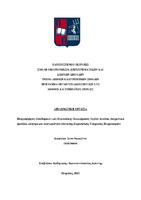| dc.contributor.advisor | Κωνσταντόπουλος, Ιωάννης | |
| dc.contributor.author | Καφούκα, Άννα - Νικολέττα | |
| dc.date.accessioned | 2023-09-11T10:03:50Z | |
| dc.date.available | 2023-09-11T10:03:50Z | |
| dc.date.issued | 2023 | |
| dc.identifier.uri | https://dione.lib.unipi.gr/xmlui/handle/unipi/15696 | |
| dc.identifier.uri | http://dx.doi.org/10.26267/unipi_dione/3118 | |
| dc.description.abstract | Η σύγχρονη πραγματικότητα υπαγορεύει ως επιτακτική τη σύσταση μιας αυτοτελούς και ανεξάρτητης Ευρωπαϊκής Υπηρεσίας Πληροφοριών, κάτι περισσότερο, δηλαδή, από ένα ετερογενές ευρωπαϊκό δίκτυο πληροφόρησης. Οι νέες απειλές, εσωτερικές και εξωτερικές, έχουν αναδιαμορφώσει το διεθνές περιβάλλον ασφαλείας και η σύσταση μιας τέτοιας υπηρεσίας σε ευρωπαϊκό πλαίσιο θα μπορούσε να συμβάλει αποτελεσματικά τόσο στην πρόληψη όσο και στην αντιμετώπισή τους, να ενισχύσει δηλαδή την ανθεκτικότητα (resilience) της Ευρωπαϊκής Ένωσης (εφεξής ΕΕ).
Αν και έχουν γίνει βήματα σε ευρωπαϊκό επίπεδο, στο πλαίσιο των πολιτικών ασφαλείας της ΕΕ, οι υπάρχοντες Οργανισμοί στο πεδίο της πληροφόρησης (intelligence), παρά την αδιαμφισβήτητα σημαντική συνδρομή τους, παρουσιάζουν ατέλειες και ελλείψεις σε πολλούς τομείς, που τους καθιστούν δυσλειτουργικούς και ίσως ανήμπορους να σταθούν απέναντι στις σύγχρονες προκλήσεις.
Παρουσιάζοντας τα κυριότερα ζητήματα ασφαλείας στο σύγχρονο διεθνές περιβάλλον, εξετάζοντας την υπάρχουσα ευρωπαϊκή αρχιτεκτονική στον τομέα της ασφάλειας και της πληροφόρησης, αναλύοντας τα εμπόδια, που διαχρονικά καθυστερούν και δυσχεραίνουν την επίτευξη ενός τέτοιου εγχειρήματος, και τα κίνητρα για την υλοποίηση του επόμενου σταδίου, η παρούσα εργασία επιχειρηματολογεί υπέρ της αναγκαιότητας αναδιαμόρφωσης του χαρακτήρα της ευρωπαϊκής συνεργασίας στον τομέα της πληροφόρησης σε ένα νομικά και πολιτικά ανεξάρτητο κεντρικό φορέα, επιφορτισμένο τόσο με τη συλλογή και την ανάλυση όσο και με τη διαχείριση των πληροφοριών. Το εγχείρημα αυτό αποτελεί πρόκληση όχι μόνο για τα κράτη-μέλη, τα οποία θα επηρεαστούν άμεσα, αλλά και για την ίδια την Ένωση ως οντότητα που βαδίζει προς μια πιο ολοκληρωμένη μορφή.
Στο σημείο αυτό, κρίνεται σκόπιμο να αναφερθεί ότι, αν και αποτελεί εύλογο ερώτημα και σημαντική πτυχή του κεντρικού ζητήματος ενδιαφέροντος, η παρούσα εργασία δεν κινείται γύρω από επιχειρησιακά και τεχνικά ζητήματα υλοποίησης ενός τέτοιου εγχειρήματος, αλλά κύριος άξονας μελέτης είναι η τρέχουσα κατάσταση και οι προτεινόμενες αλλαγές σε θεσμικό επίπεδο. | el |
| dc.format.extent | 73 | el |
| dc.language.iso | el | el |
| dc.publisher | Πανεπιστήμιο Πειραιώς | el |
| dc.rights | Αναφορά Δημιουργού-Μη Εμπορική Χρήση-Όχι Παράγωγα Έργα 3.0 Ελλάδα | * |
| dc.rights.uri | http://creativecommons.org/licenses/by-nc-nd/3.0/gr/ | * |
| dc.title | Πληροφόρηση (intelligence) και ευρωπαϊκή ολοκλήρωση : ισχύον πλαίσιο, διαχρονικά εμπόδια, κίνητρα και αναγκαιότητα σύστασης Ευρωπαϊκής Υπηρεσίας Πληροφοριών | el |
| dc.type | Master Thesis | el |
| dc.contributor.department | Σχολή Οικονομικών, Επιχειρηματικών και Διεθνών Σπουδών. Τμήμα Διεθνών και Ευρωπαϊκών Σπουδών | el |
| dc.description.abstractEN | The modern reality indicates that it is imperative for the European Union (hereafter EU) to establish an independent European Intelligence Service - something more than a heterogeneous European information network. New threats, internal and external, have acutely reshaped the international security landscape. The foundation of a new Intelligence Body could effectively contribute to the prevention, management, and timely response to threats, thereby significantly strengthening the resilience of the EU.
Although important steps have been taken, existing Organisations and networks in the security and information field within the European framework present imperfections and deficiencies in many areas and for different reasons. These issues make them dysfunctional and possibly incapable to face the modern security challenges.
Presenting the main security issues, examining the existing European architecture in the security and intelligence sector, analysing the long standing and deeply rooted obstacles that delay and hinder the achievement of such an initiative - the establishment of a European Intelligence Service within the Common Foreign and Security Policy (hereafter CFSP) framework - and the incentives for the next stage, this master thesis argues for the necessity of reshaping the model of European information cooperation into a legally and politically independent central Body, responsible for the collection, analysis and management of information and data. This project is a challenge, not only for the member states, that will be directly affected, but also for the EU itself as an entity that is moving towards a more integrated form.
At this point, it is mentioned that, although it is a reasonable question and a significant aspect of the main topic, this paper does not revolve around operational and technical issues, but the central axis of this study is the current situation and the changes needed to be considered at an institutional level. | el |
| dc.contributor.master | Διεθνείς και Ευρωπαϊκές Σπουδές | el |
| dc.subject.keyword | Ευρωπαϊκή Ένωση | el |
| dc.subject.keyword | Κοινή Εξωτερική Πολιτική και Πολιτική Ασφαλείας (ΚΕΠΠΑ) | el |
| dc.subject.keyword | Πληροφόρηση | el |
| dc.subject.keyword | Ευρωπαϊκή Υπηρεσία Πληροφοριών | el |
| dc.subject.keyword | Θεσμικά Όργανα | el |
| dc.subject.keyword | Αναθεώρηση συνθηκών | el |
| dc.subject.keyword | European Union | el |
| dc.subject.keyword | Common Foreign and Security Policy (CFSP) | el |
| dc.subject.keyword | Intelligence | el |
| dc.subject.keyword | European Intelligence Service | el |
| dc.subject.keyword | Security institutions | el |
| dc.subject.keyword | Treaties revision | el |
| dc.date.defense | 2023-07-20 | |



